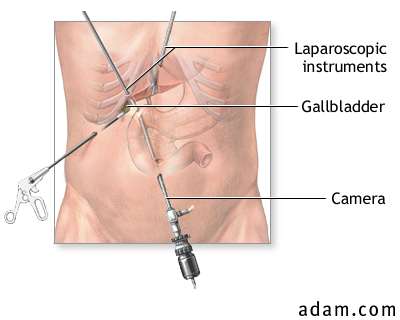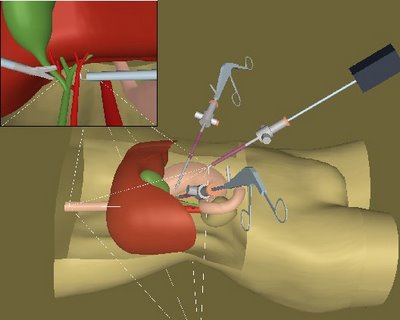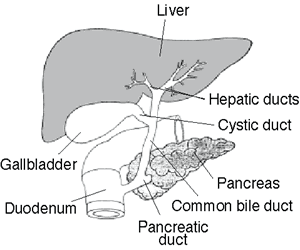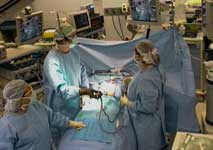
Last October, I posted about my gall bladder dilemma, where I explained my reasons for hesitating to have my gall bladder removed, and my request for information from people who faced the same decision.
There were many interesting answers to that post. I decided to have the surgery, partly based on the replies I got, and partly based on my intuition. I just had a hunch that no matter what I did to help my gall bladder, it would remain a chronic problem, and that I was risking having emergency surgery one day. So on November 15th, I had the surgery. They kept me over night, released me the next day, and now I am at home, recuperating.
The doctor told me that my gall bladder had lots of scar tissue. I think it had been sick for a very long time. I can feel where the organ used to be. When I was a kid, I used to have pain in my side there if I ran very far. As I grew older, it would still hurt there if I ran more than a city block or so. Perhaps it was related.
Below is me, post-op. They shaved my stomach, and made five incisions.


I seem to have one extra hole poked in me. I'm supposed to see the surgeon on a follow up vist at the end of the month, I suppose I'll find out what that was for. I know that one of the instruments is supposed to suck the bile out of the gall bladder and collapse it, making it easier to pull out.
I've been instructed that I can shower with the bandages on, but not to soak in a bathtub or hot tub. I can remove bandaids, but I am to leave the "steri-strips" on until they fall off, or the doctor removes them.
I am sleepy a lot, so I take naps when I can. I do some light housework like washing dishes and such, but I'm avoiding heavy lifting for now. I think it's important to get up and move around, to keep from getting stiff; if I lie around too much, it hurts more.
I was perscribed pain pills, Hydrocodone, but I only took one when I got home. They are rather strong and can cause constipation, so I started taking Advil instead, and it seems to do the job of managing pain just fine. I was taking an Advil every four hours, but now I am taking them less frequently, as needed. Every day the soreness is less.
It's four days after the surgery now, and I haven't had any problems with foods. Other people in my family have had this surgery, and they also were problem free, so I continue to hope that will be the case for me also.
It would seem that the majority of people don't have side effects, or not many if they do. Some side effects are temporary. If you are considering the surgery, it helps to read about people's different experiences, so that you are aware of potential side effects that could happen, so you won't be taken completely by suprise if they do occur. After surgery, I think it's important to eat a good diet that is healthy for the liver, to keep the bile healthy and avoid any complications in the future. Without a gall bladder, stones can form in the liver itself if the bile is unhealthy, so why risk that?

I've been looking at some of the searches people have done that pulled up my first gall bladder post, and I've found some interesting links to other people's experiences. One of the most detailed and informative ones was this one:
2001: A Gall Bladder Removal
It shows some of the side effects that can occur as a result of the surgery.
Everyone is different. Some people have side effects, like Mr. Griggs in the above link, and yet many have none at all. Some of the side effects people experince can lessen or disappear over time.
Some people seem to develop problems months or years later. That is one reason I am sticking to a healthy diet, one that is good for my liver. I believe gall stones form because the bile the liver produces is out of balance, too thick, which causes the formation of sludge and stones. Just because I now don't have the gall bladder to form stones, doesn't mean it's ok to ignore the quality of bile the liver produces. I've been drinking lots of organic apple juice, because the malic acid is supposed to be good for thinning the bile. It helped reduce the inflamation my gall bladder had, and it cleared out the sludge. It quieted the gall bladder, making the surgery a bit easier.
Some people claim that over time, drinking organic apple juice might have dissolved the stones too, but I didn't want to wait that long and take that chance. It took years to get as bad as it did, and I wasn't sure I had years to wait to dissolve stones. The worst attack I had was due to acute inflammation, and that was not something I wanted to risk again. But I have always liked apple juice, and our local supermarket keeps two reasonabley priced organic brands in stock, so I will keep it as part of my diet.
I've also eliminated hydroginated oils from my diet. For example, I've switched to eating natural peanut butter (the kind that needs to be stirred up and kept in the fridge). I've cut back on confections made with white flour and sugar, like commercial cookies and cakes and such, as they were always the things that triggered my attacks. I've always cut fat off of steaks and meats, and I continue to do so.

Some people complain about problems with spicey foods, but I've been able to eat them without any issues. Some people complain that they are not able to drink as much alcohol as they did. I usually have a glass of wine with dinner, and I continue to do so, without problems.
All things considered, I would say it was the right decision to make in my case. I may do some updates on this topic as time goes on, as it does seem to be one that many people are interested in.

